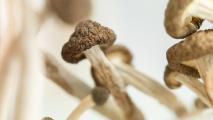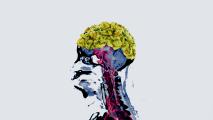Showing 678 results
Pain relief from coronavirus may be helping it spread
Rather than feeling sick, some people may be getting pain relief from coronavirus — a discovery that could impact both the pandemic and the opioid epidemic.
The augmented, virtual, human-machine future of surgery is here
Advancements in XR technologies are rapidly integrating into the future of surgery.
DNA might be able to explain varying coronavirus symptoms
Scientists are looking for genetic factors that could explain varying coronavirus symptoms amongst seemingly similar COVID-19 patients.
Pocket-sized bot can perform surgery better than humans
A tiny origami-inspired robot assists surgeons in a mock surgery.
Y Combinator startups turn resources toward coronavirus
More than 25 Y Combinator startups have joined the COVID-19 response effort — find out how you can help these businesses fighting the coronavirus.
This parent is helping push autism gene therapy forward
Not too long ago, autism gene therapy was a pipe dream. Now, armed with specific targets and new methods, a small wave of gene therapies is gathering.
Good news, bad news, and reasons to be optimistic about COVID-19
Much has evolved since the earliest predictions about COVID-19. Here's how the data is updating our view on the coronavirus.
MDMA effects, risks, and rewards explained
MDMA, also known as Molly or Ecstasy, is a synthetic psychoactive drug. MDMA effects include enhanced pleasure and a heightened sense of touch and sound.
Intro to LSD
LSD, also known as acid, is a synthetic chemical that causes hallucinations, synesthesia, and sometimes, distress - the dreaded “bad trip.”
Crowdsourcing the seed for coronavirus antiviral medications
Foldit players are solving a protein structure puzzle that could help kickstart coronavirus antiviral medications.
Can RNA editing catch up to CRISPR?
Developed in the 1980s, RNA editing was overshadowed by CRISPR. But the last few years have seen a resurgence of interest in the gene editing technique.
$25 genetic test can improve asthma treatment for kids
Before prescribing an asthma treatment to children, doctors should use a cheap genetic test to look for a specific altered gene, according to a new study.
Here is every potential coronavirus treatment and vaccine
Across the globe, researchers are scrambling to find a coronavirus treatment or vaccine that could bring the COVID-19 outbreak to a swift end.
Beyond COVID: mRNA vaccines may treat cancer and more
The technology used to make the COVID-19 vaccine could be used to treat other diseases too.
World’s fastest supercomputer finds 77 drug candidates that could help battle COVID-19
The Summit supercomputer made quick work of complicated simulations to identify 77 compounds that could be promising COVID-19 treatments.
Medical cannabis explained
Medical cannabis is everywhere. We're answering your basic questions and unpacking the promises and pitfalls, based on the latest research.
Study may explain why cancer gets more aggressive as we age
A molecule in the blood of older people promotes the spread of cancer, which could explain the link between age and metastatic cancer.
Every significant breakthrough that’s stemmed from the pandemic
A timeline of coronavirus solutions from the people on the frontlines of the fight against COVID-19.
We may have found a drug to curb meth addiction
Meth addiction is on the rise, so this team of researchers is working to develop the first FDA-approved medication to treat the use disorder.
Twin study suggests genes factor into COVID-19 symptoms
Genetic factors may explain about 50% of the differences in people’s COVID-19 symptoms, according to a study of more than 2,600 twins in the U.K.
The daily coronavirus news roundup – friday, march 20th
Each day, Freethink publishes the “Coronavirus Roundup,” a collection highlighting the latest must-read COVID-19 stories from us and others.
Crowdsourcing ideas for animal conservation technology
The Digital Makerspace looks to an online community of thinkers to identify the most crucial animal conservation problems and solutions.
These are the medical breakthroughs that inspired us in 2020
2020 has put medicine to the forefront like never before. Freethink’s B. David Zarley looked back on the year and chose three medical developments that inspired him.
New HIV vaccine gives monkeys longer-lasting protection
Scientists have created an HIV vaccine that triggers two types of immune response, providing monkeys with longer-lasting protection from infection.
The daily coronavirus news roundup – tuesday, march 24th
A hospital ship off the coast of Los Angeles, the potential new coronavirus treatment, and other fresh coronavirus news updates.
Can green light therapy cure chronic pain?
Scientists are finding that exposure to the color green, also known as green light therapy, could provide natural chronic pain relief.
Plasma from coronavirus survivors helps sick patients recover
Two studies in China found that plasma from coronavirus survivors helps patients with severe cases of COVID-19 recover within days of treatment.
Astronauts lose muscle in space. These mice could hold the solution
Without gravity, astronauts experience muscle and bone loss, limiting mission time. Mice that gain mass in orbit may hold the key to preventing that loss.
Series|
Catalysts
Rethinking addiction recovery with fitness
In partnership with Stand Together
As drug overdose deaths climb higher, this gym is challenging the thinking behind traditional models for addiction recovery services with free memberships open to anyone sober for at least 48 hours.
The world's first living machines
The world's first living robots may one day clean up our oceans.
Is police reform even possible?
Here are four things we can change to reduce police violence and increase accountability.
This genetically modified cow could transform beef production
Cosmo the bull calf has an extra SRY gene, which makes him more likely to sire male cows — and also makes him a strong candidate for use as a GMO food.
Doctors need to learn what illnesses look like on darker skin
Medical student Malone Mukwende wrote a book to teach others how to spot clinical signs of illness on patients with darker skin tones.
Survivors’ plasma might prevent coronavirus infections
Injections of COVID-19 survivors' blood plasma might prevent coronavirus infections, making them a promising stopgap until a vaccine is ready.
CRISPR may unlock targeted cannabis therapy
New medicinal cannabis research shows potential for personalized drug therapy, without the side effects.
What's special about cancer-killing nanobots? precision.
These tiny, robotic machines can deliver drugs directly to infected cells, and they're changing the future of medicine.
How to explain falling COVID-19 mortality rates
COVID-19 mortality rates are dropping in the U.S. and other nations — a few theories explain why more people are surviving the coronavirus.
Our spare computer is helping fight coronavirus. yours can, too.
Help fight the coronavirus by donating your spare computing power to Folding@home, which will use it to run valuable protein-folding simulations.
Contact-tracing tech advances, the new saliva test, and more COVID-19 updates
In our weekly news roundup, we take you inside the fight against COVID-19 to explore the solutions on the frontlines of an unprecedented global response.
Psychedelic mushrooms explained
Psychedelic mushrooms, AKA magic mushrooms or psilocybin mushrooms, are currently being researched as a treatment for depression, addiction, and more.
Legal pot is finally growing up and going to college
As medical marijuana becomes mainstream, so does the need for an educated workforce in the industry. Enter the nation's first-ever cannabis degree program.
Genetic “off switch” may lead to new breast cancer treatment
A much-needed triple negative breast cancer treatment could center on the suppression of a single gene identified in a new Tulane University study.
Series|
Dope Science
Microdosing psychedelics
Microdosing is the no-flowers-in-your-hair practice of regularly taking minimal amounts of hallucinogenic substances. Although it’s currently illegal, millions of dollars are being poured into further research.
New promise for psychedelics and depression
New findings on psychedelics and depression show the benefits of microdosing, and could present more effective treatment options.
Medieval medicine yields modern weapons
Deadly antibiotic-resistant superbugs require new weapons. Ancient and medieval medicine may point us to where to find them.
What is protecting kids against the coronavirus?
Something is protecting kids against the coronavirus, and researchers want to figure out what it is so they can use it to develop a treatment.
MDMA has long-lasting benefits as a PTSD treatment
The benefits of MDMA therapy as a PTSD treatment appear to last for at least a year, according to a newly published paper.
New PTSD therapy dulls the sting of painful memories
A Canadian researcher’s reconsolidation therapy is helping people overcome PTSD by allowing them to edit painful memories to be less emotionally impactful.
Gene therapy hailed as cure for sickle cell disease
A gene therapy that uses CRISPR to edit a patient's own stem cells looks like a “functional” cure for sickle cell disease and beta thalassemia.
Healing PTSD with MDMA therapy
New hope for PTSD sufferers is coming from an expected quarter: MDMA.
The daily coronavirus news roundup – friday, march 27th
Slowing infection rates in New York, a robot that's delivering vital supplies, and other fresh coronavirus news updates.
Can a wellness app really change someone’s life?
In partnership with Virgin Pulse
America has the highest per capita health spending in the world, and yet, worse population health outcomes than most other developed nations. This wellness app gets to the heart of the issue.
Addict-turned-neuroscientist on addiction and the brain
In our interview with neuroscientist Judith Grisel, she discusses the state of research on addiction and the brain, as well as society’s view of addicts.
Mobile decontamination units could extend supply of PPE
To extend the supply of PPE at hospitals during the coronavirus pandemic, a team of engineers transformed a shipping container into a decontamination unit.
Doctors debate over using radiation therapy for COVID-19
Citing evidence from the past and recent, small trials, some doctors are calling for low-dose radiation therapy for COVID-19 patients. Controversy has followed.
Fighting to get breast pumps to mothers in prison
Breastfeeding isn’t a right afforded to mothers in prison. One former inmate wants to change that.
CBD slows growth of brain cancer cells in a Petri dish
The cannabis compound CBD can slow the growth of brain cancer cells, but it’s a long way from a new cancer treatment.
Doctors test solution for COVID-19 phenomena, silent hypoxia
Doctors treating COVID-19 patients are testing the ability of common blood thinners to address silent hypoxia, one of the disease’s most alarming phenomena.
New coronavirus test offers results in minutes
Abbott Laboratories’ new coronavirus test can tell if a person has COVID-19 in just five minutes — far faster than existing testing methods.
NY’s bail reform challenges a biased system
Seeking justice in a broken system, the state of New York eliminates cash bail for most misdemeanors.
FDA authorizes first at-home coronavirus test kit
The FDA has authorized LabCorp’s at-home coronavirus test kit, meaning people no longer need to leave their houses to find out if they have COVID-19.
The science behind your crazy pandemic dreams
If you’ve been having strange dreams and poor sleep during lockdown, you’re not alone. The anxiety-inducing pandemic, less activity, and more screen-time have many more people struggling with insomnia than usual.
New coronavirus vaccine candidate creates antibodies in mice
A new coronavirus vaccine candidate that delivers inoculation via a microneedle patch has shown promise in a peer-reviewed mouse study.
New coronavirus test could check one million people daily
BillionToOne has announced the creation of a coronavirus test it says would allow the U.S. to check more than one million people for COVID-19 daily.
Scientists use CRISPR to reverse diabetes in mice
Scientists have used CRISPR to correct a diabetes-causing mutation in stem cells and then use those cells to reverse diabetes in mice.
Major League Baseball joins massive coronavirus antibody study
More than 10,000 Major League Baseball players and employees agreed to have their blood tested for a massive coronavirus antibody study.
Doctors use AI to test new coronavirus treatments on patients
The University of Pittsburgh Medical Center launched a new trial that uses artificial intelligence to test promising coronavirus treatments as quickly as possible.
It's safe to order takeout during the coronavirus pandemic. here's why.
Many experts agree that you can safely order takeout during the coronavirus pandemic — you just need to follow these steps.
9 ways the 2010s decade changed the world
From Tinder to CRISPR, these are the top moments, movements, and ideas through which the 2010s decade shaped the world as we know it.
FDA approves first saliva test for coronavirus
The FDA has granted a saliva test for coronavirus emergency use authorization, giving health officials a new way to diagnose COVID-19.
Take a trip to Johns Hopkins' new psychedelic research center
Johns Hopkins is throwing its considerable clout behind the fast-growing field of psychedelic research, pouring $17 million into a research center to study the hallucinogenic drugs.
Blood enzyme could explain severe impact of coronavirus in men
A new study suggests that higher concentrations of the ACE2 blood enzyme could explain the particularly deadly impact of the coronavirus in men.
Why scientists are turning the coronavirus’ structure into music
MIT scientists have translated a key part of the coronavirus’ structure into music — and the song could help researchers find a way to stop the virus.
New study boosts case for at-home coronavirus tests
A new study eliminates one major argument against at-home coronavirus tests: that patients won’t be able to collect usable samples themselves.
Qualified immunity might not protect police for much longer
The U.S. government is considering changes to qualified immunity, a doctrine that protects police from civil lawsuits.
Computer scientists build new tool to fight coronavirus
Computer scientists are using AI and text mining to sort through thousands of coronavirus research papers that could help fight the disease.
Series|
Catalysts
The mental health movement for Chicago’s inner city youth
In partnership with Stand Together
A remarkable transformation is taking place in several inner-city Chicago schools, and it's resulting in fewer gangs, drugs, and homicides. Could this new model of group therapy be the cause, and is it scalable?
Can friendship keep at-risk youth off the streets?
In partnership with Stand Together
Carlos felt addicted to the thrill of crime at a young age. Today, he yields a different, positive influence on the streets with UTEC.
The long-term health effects of COVID-19
As their numbers swell, some survivors are reporting long-term health effects of COVID-19.
Cancer survivor gives birth thanks to a new fertility procedure
A French cancer survivor is the first person to give birth via a fertility treatment that involves freezing and thawing eggs that underwent in vitro maturation.
Stimulating monkeys’ brains snaps them out of unconsciousness
Researchers found that they could induce a state of consciousness in an unconscious monkey by electrically stimulating a specific part of the animal’s brain.
The mission to reunite homeless with their families
Volunteer digital detectives are helping homeless people reunite with their families.
A deadly virus emerged in South Africa in 2008. Then it vanished.
A deadly new virus killed a South African safari agent and three others, then disappeared without a trace. What can we learn from a unique outbreak?
Algorithm clears thousands of marijuana convictions in just one minute
With this new system that identifies candidates for criminal record clearance and even auto-fills forms, offenders don’t even need to apply.
The formerly incarcerated fighting for criminal justice reform
In partnership with Chan Zuckerberg Initiative
These formerly incarcerated individuals are fighting to give people who’ve served their time a second chance by advocating for change in one of the country’s most notorious justice systems.
Should we legalize gangs?
Gangs are a major cause of violence and organized crime. Here’s why countries should think twice before trying to...
Your new sex ed teacher is a chatbot
This chatbot is filling in gaps in sex education by talking with teens to answer awkward questions about topics like health, sexuality, and identity.
Why drugs are hurting more people than ever – and what to do about it
Is the solution to dangerous drugs... making them safer?
Scientists grew a mini brain in a lab. It has human-like brain waves.
For the first time, a lab-grown mini brain has brain waves. Researchers can now launch new ways to study brain disorders. But the question of consciousness in the brain-like organoid could raise concern.
Treating depression at home with a tDCS headset
At-home tDCS headsets are helping people treat their depression without having to go to a doctor’s office.
Scientists sidestep restrictions on cannabis research by taking their lab mobile
This mobile lab, run by scientists at the University of Colorado Boulder, is one of several workarounds developed...
Shedding the stigma of substance use
In partnership with Stand Together
By achieving fitness goals together, The Phoenix community is peeling off the shame, regret, and stigma often associated with addiction.
Series|
Future of Fertility
Uterus transplants: A step closer to overcoming infertility
About 1 in 500 women have a condition that prevents pregnancy called absolute uterine factor infertility, but recent developments show promise that a uterus transplant surgery could be the solution.
Old Skool Café provides an alternative to gangs and violence
In partnership with Stand Together
As a former prison guard, Teresa Goines watched kids drift in and out of the justice system. Now she runs a jazz-themed eatery that hires at-risk youth and gives them a place to learn and grow.
The strange science of sports recovery with Christie Aschwanden
From infrared pajamas to cryo chambers, athletes swear recovery methods give them an edge on the playing field. But what does science have to say about it?
How Old Skool Café helped this teenager overcome adversity after trauma
In partnership with Stand Together
After suffering a violent gang beating, Desiree Maldonado experienced major medical and emotional issues. She turned from a shy and nerdy 14-year-old kid to a hard and angry rebel. This is how one restaurant job changed her trajectory.
Series|
Dope Science
Cannabis as a natural treatment for autism
When typical medications simply aren’t doing enough to manage their children’s symptoms, mothers like Jenni Mai are turning to medical marijuana. But with current regulations, parents are having to become pharmacists for their own families, and some are even moving across the country so they can legally access cannabis.
Series|
Future of Fertility
IVG: making babies from skin cells
The designer babies of the future are closer than we think. With a new process called IVG, a person could essentially choose their baby’s traits, and same-sex couples could make a biological family.
Series|
Catalysts
Racing out of homelessness
This running club that meets at 5:45am is helping the homeless transform their lives.
Nature is good for you. What about VR nature?
Nature has the power to reduce stress and enhance our moods. Can VR nature experiences be a substitute for physically spending time in the outdoors?



































































































